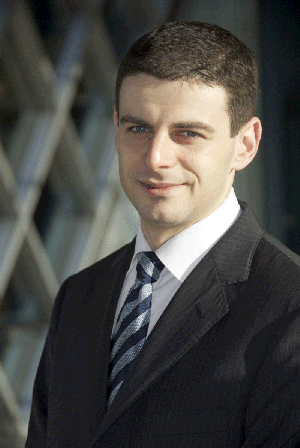Security specialist Michael Rozin is adapting Israeli counterterrorism techniques to the American scene
By DAVID RUBENSTEIN / Special to the AJW
Michael Rozin, an Israeli security expert who came to Minneapolis in 2005, is happy to explain his business.
“Whether it’s a terrorist attack or a criminal act, there are two main factors that play a role,” he says. “One is intent, the other is means.”
Traditionally in the United States, according to Rozin, when it comes to protection from terrorist incidents, the focus has been on detecting the means, or the weapon. He rattles off the sequence: Shoe bomber — we take off our shoes. Plot to blow up a trans-Atlantic flight using liquid explosives — restrictions on liquids. Now, with the underwear bomber, body scanners and pat downs.
“In Israel,” he says, “we learned that detecting the weapon is important, yes; but this is not the solution because the terrorists are very creative and innovative guys, and they learn how to overcome all the technological solutions that you invent to try to detect the bomb. Yet one thing that they cannot conceal is the intent. We address the intent.”
Rozin is currently employed at the Mall of America, where his title is special operations security captain. He recently was featured in the TLC cable show Mall Cops: Mall of America, which showed him training MOA security officers.
In charge of terrorism prevention at MOA since 2005, Rozin employs a system there that is based on behavior detection methods that were developed in Israel.
In part because of a cohort of Israelis like Rozin — military veterans and security experts who have parlayed their experience into a successful industry in the U.S. — these methods are now being used here at a number of major facilities and law enforcement agencies.
Rozin himself has branched out, deciding in 2009 to start his own company, Rozin Security Consulting, LLC. He now lists among his clients the Minneapolis Federal Reserve Bank, Metro Transit, divisions of both Twin Cities police departments and, in partnership with another consulting firm, the Public Building Commission of Chicago.
In Israel, Rozin served in an Israel Defense Forces border infantry unit. The Hebrew name of the unit translates as Stinger, named for the Stinger missiles they carried. Literally carried, Rozin adds, on their backs, “whereas in the United States usually they use vehicles for that purpose.”
This distinction in a way gets to the heart of what some analysts say is a recurring problem with U.S. security strategy, that it tends to lurch instinctively toward the high-tech solution. Stingers are the light but deadly heat-seeking missiles that the Reagan administration shipped in large numbers to Islamic fighters in Afghanistan during the 1980s. They enabled a single mujahid (Muslim guerilla fighter) on foot to shoot down a helicopter, and some argue they were the decisive factor in turning back the Soviets. Military historians might see some irony in the fact that Stingers also showed up on the backs of Israeli border units.
After serving in the IDF, Rozin went to work for the Israeli Airports Authority at Ben-Gurion International Airport. There he was involved in both training and operations, under the oversight of Shin Bet.
In Israel, as visitors to the country soon find out, airport security includes a simple low-tech procedure. Someone looks you in the eye and politely asks a few questions that manage to get right into your business.
The situation at the Mall of America, however, differs in major ways from Ben-Gurion Airport. There are no checkpoints, and during the busiest holiday shopping days the number of visitors could approach 200,000, while a busy day at Ben-Gurion might see 60,000.
Still, the basic principles are adaptable, according to Rozin. “We train our officers, first, to detect behavior indicators that can indicate potential harmful intent. Then, once such indicators are detected, to conduct what are called security interviews, built to determine whether a person does or does not pose a threat to our environment.”
Rozin also trains non-security personnel, from human resources to maintenance and ride operators, in maintaining vigilance and recognizing suspicious behavior. “You have to create a culture of security,” he says.
Rozin came to the United States in 2005, to Minneapolis. Why? A good question, he says, with a nod to the blustery weather outside his window.
“The reason is really my wife. She is from here. We met in Israel and throughout my work for the Israeli Airport Authority, we dated. We got engaged, and at some point I decided to try it out here. She is the main reason. Despite the cold she is worth it.”
Rozin’s wife, Kathryn Rozin, is managing director of Rozin Security Consulting. In addition, the company has three employees, “with backgrounds similar to mine,” Rozin says.
Rozin anticipates no shortage of work.
“I think that the threat of terrorism in the United States is going to become an unfortunate part of American life.”
(American Jewish World, 2.4.11)




















